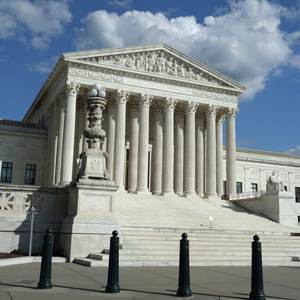Supreme Court Roundup: Win for storage locker robber; Cosby victory; Thomas on Section 230

Image from Shutterstock.
A storage locker robber and actor and comedian Bill Cosby had victories in the U.S. Supreme Court on Monday, while Justice Clarence Thomas called for consideration of the immunity afforded to online publishers.
Here is a roundup of the high court’s actions:
• In Wooden v. United States, the Supreme Court held that William Dale Wooden wasn’t subject to a sentencing enhancement under the federal Armed Career Criminal Act. The law applies when a gun offender has at least three prior convictions on “occasions different from one another” for violent felonies. Wooden had previously pleaded guilty to 10 counts of burglary for 10 storage locker break-ins at one storage facility on one night in Georgia. “Convictions arising from a single criminal episode, in the way Wooden’s did, can count only once under ACCA,” wrote Justice Elena Kagan in her opinion for the court. (The March 7 opinion, SCOTUSblog, the New York Times)
• In Pennsylvania v. Cosby, the Supreme Court denied cert in a case seeking to revive sexual assault charges against Cosby. The Pennsylvania Supreme Court had overturned Cosby’s conviction in June 2021 for the 2004 sexual assault of Andrea Constand, a Temple University employee who said Cosby had drugged her before the assault at Cosby’s home. The state high court had said Cosby was protected by a prior district attorney’s promise not to prosecute, which led Cosby to testify in Constand’s civil suit. (The Supreme Court order denying cert, SCOTUSblog, CNN)
• In Doe v. Facebook, the Supreme Court refused to consider a Texas Supreme Court decision holding that Facebook was protected from common law claims by a sex-trafficking victim under Section 230 of the Communications Decency Act. The law protects websites from lawsuits based on content posted by third parties. In a statement regarding the cert denial, Thomas said the Texas decision exemplifies how courts have used Section 230 to confer “sweeping immunity” on some of the world’s largest companies. The Texas court protected Facebook, Thomas said, even though it allegedly knows that its system facilitates human traffickers in identifying and cultivating victims. If Congress doesn’t step in to clarify the scope of Section 230, the Supreme Court “should do so in an appropriate case,” Thomas said. (Thomas’ March 7 statement, SCOTUSblog, Law360)



